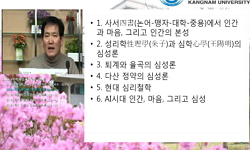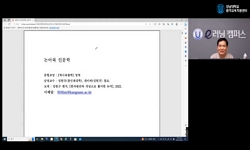A general understanding of Confucianism in Korean society is premodern and conservative. Moreover, Confucianism has been regarded as a fundament factor, which made Korea a Japanese's colony. And some intellectuals analyze that a social malady in Korea...
http://chineseinput.net/에서 pinyin(병음)방식으로 중국어를 변환할 수 있습니다.
변환된 중국어를 복사하여 사용하시면 됩니다.
- 中文 을 입력하시려면 zhongwen을 입력하시고 space를누르시면됩니다.
- 北京 을 입력하시려면 beijing을 입력하시고 space를 누르시면 됩니다.

四書에 대한 미 학계의 최신 연구(1) — 『論語』와 『孟子』에 관한 연구 — = The Current Researches on the Four-Books(四書) in American academy
한글로보기https://www.riss.kr/link?id=A104007585
-
저자
성동권 (성균관대학교)
- 발행기관
- 학술지명
- 권호사항
-
발행연도
2009
-
작성언어
Korean
-
주제어
the study on the Four-Books ; American academy ; Analects ; yen(仁) ; ye(禮) ; Mencius ; yen-shing(人性) ; 天人無間 ; 한마음(Han-Maum) philosophy ; 사서연구 ; 미학계 ; 『논어』 ; 인과 예 ; 『맹자』 ; 인성론 ; 천인무간
-
등재정보
KCI등재
-
자료형태
학술저널
- 발행기관 URL
-
수록면
363-396(34쪽)
-
KCI 피인용횟수
0
- DOI식별코드
- 제공처
- 소장기관
-
0
상세조회 -
0
다운로드
부가정보
다국어 초록 (Multilingual Abstract)

Apart from the evaluation of Confuciansm in Korea, how Confucianism has been understood in West? To give an answer of this question I want to investigate the current researches on the Four-Books(四書) in American academy. Hereupon I will study how America academy has approached the Four-Books since 1990s and what kinds of current researches have been formed in their studies.
After analyzing papers regarding the Four-Books, I classified the current researches into 4 categories.
1) The interpretation of 『論語』(Analects)
2) The interpretation of 『孟子』(Mencius)
3) The study on the ethical characteristics of Confucianism
4) The study on confucianism from the ethical perspectives
It is impossible to discuss all of the subjects in this paper since there is the limit of the amount of paper. So, in this paper I will examine two topics, the interpretation of 『論語』 and 『孟子』. And the rest of the topics will be handled in next paper.
The core of the interpretation of Analects(『論語』) is about the concept of yin(仁) and ye(禮) and the harmonious interpretation of Analects. Regarding the concept, yi(仁) is the collection of emotions or the inclination of emotions. And regarding the harmonious interpretation, the discussion was ended in the skeptical conclusion.
The main theme about Mencius(『孟子』) is the meaning of the yen-shing(人性) in Mencius. In this debate, there are two groups, which have a different ideas from each other. One group insists that yen-shing(人性) is the outcome aquired by education. The other group maintains that yen-shing is inherent in human being. This debate has been caused by the different perspective, which is historical or philosophical.
Is the current researches on Analects and Mencius right? I think that these brilliant papers have failed to notice the key to understand the essence of Confucianism. And the key is the theory of the knowledge in Confucianism, 天人無間(I call this Han-Maum philosophy). Viewing the American academy regarding the study on the Four-Books, we need to study the theory of the knowledge in Confucianism, Han-Maum philosophy.
A general understanding of Confucianism in Korean society is premodern and conservative. Moreover, Confucianism has been regarded as a fundament factor, which made Korea a Japanese's colony. And some intellectuals analyze that a social malady in Korea is resulted from Confucian thought in Choson dynasty in Korea.
Apart from the evaluation of Confuciansm in Korea, how Confucianism has been understood in West? To give an answer of this question I want to investigate the current researches on the Four-Books(四書) in American academy. Hereupon I will study how America academy has approached the Four-Books since 1990s and what kinds of current researches have been formed in their studies.
After analyzing papers regarding the Four-Books, I classified the current researches into 4 categories.
1) The interpretation of 『論語』(Analects)
2) The interpretation of 『孟子』(Mencius)
3) The study on the ethical characteristics of Confucianism
4) The study on confucianism from the ethical perspectives
It is impossible to discuss all of the subjects in this paper since there is the limit of the amount of paper. So, in this paper I will examine two topics, the interpretation of 『論語』 and 『孟子』. And the rest of the topics will be handled in next paper.
The core of the interpretation of Analects(『論語』) is about the concept of yin(仁) and ye(禮) and the harmonious interpretation of Analects. Regarding the concept, yi(仁) is the collection of emotions or the inclination of emotions. And regarding the harmonious interpretation, the discussion was ended in the skeptical conclusion.
The main theme about Mencius(『孟子』) is the meaning of the yen-shing(人性) in Mencius. In this debate, there are two groups, which have a different ideas from each other. One group insists that yen-shing(人性) is the outcome aquired by education. The other group maintains that yen-shing is inherent in human being. This debate has been caused by the different perspective, which is historical or philosophical.
Is the current researches on Analects and Mencius right? I think that these brilliant papers have failed to notice the key to understand the essence of Confucianism. And the key is the theory of the knowledge in Confucianism, 天人無間(I call this Han-Maum philosophy). Viewing the American academy regarding the study on the Four-Books, we need to study the theory of the knowledge in Confucianism, Han-Maum philosophy.
이에 연구자는 미학계 연구흐름을 1) 『논어』해석, 2) 『맹자』해석, 3) 유학의 종교적 특질 연구, 4) 윤리학적 관점에서 접근 등 네 가지 주제로 분류했다. 특히 위 네 주제를 한자리에서 모두 검토하는 것은 지면의 한계로 인해 불가능하므로 여기에서는 우선, 『논어』와 『맹자』의 해석에 대한 미 학계의 논의들을 우선 소개하고 다음 기회에 나머지 주제들을 소개하기로 한다.
『논어論語』에서 가장 중요하게 다뤄진 문제는 핵심개념인 인과 예의 개념과 각 장들 사이에서 발생하는 모순을 조화롭게 해석하는 것이었다. 결과 인은 예의 정신을 이루는 감정의 집단 내지 경향으로 정의되었고 『논어』를 총체적으로 조화롭게 해석할 수 있는 가능성에 대해 회의적인 결론을 이끌어 냈다.
『맹자孟子』에서 미학계가 첨예한 논쟁을 벌인 분야는 인성론이다. 가장 쟁점이 되었던 것은 맹자의 인성이 교육의 결과로 획득되는 것인지, 아니면 본래부터 고유한 것인지에 관한 것이었다. 이러한 이해의 대립은 인성에 대해서 역사적 접근과 철학적 접근에서 기인한 것이다.
미학계의 『논어』와 『맹자』의 연구는 올바른 것인가? 이들 연구가 놓치고 있는 것은 유학을 이해하기 위한 인식론이다. 유학의 인식론은 천인무간天人無間의 인식론(나는 이것을 ‘한마음 철학’이라고 부른다.)이므로, 이것을 제대로 이해하지 못하면 유학을 제대로 이해할 수 없다. 미학계의 연구성과를 보았을 때, 가장 시급한 것은 천인무간의 인식론을 명확하게 정리하는 것이다.
본 논문의 주제는 유학에 대한 서구의 이해를 살펴보는 데 있다. 이를 위해 논문은 구체적으로 1990년 이후 미 학계가 사서를 어떠한 관점에서 어떻게 연구하고 있는지 살펴보고자 한다. 이...
본 논문의 주제는 유학에 대한 서구의 이해를 살펴보는 데 있다. 이를 위해 논문은 구체적으로 1990년 이후 미 학계가 사서를 어떠한 관점에서 어떻게 연구하고 있는지 살펴보고자 한다.
이에 연구자는 미학계 연구흐름을 1) 『논어』해석, 2) 『맹자』해석, 3) 유학의 종교적 특질 연구, 4) 윤리학적 관점에서 접근 등 네 가지 주제로 분류했다. 특히 위 네 주제를 한자리에서 모두 검토하는 것은 지면의 한계로 인해 불가능하므로 여기에서는 우선, 『논어』와 『맹자』의 해석에 대한 미 학계의 논의들을 우선 소개하고 다음 기회에 나머지 주제들을 소개하기로 한다.
『논어論語』에서 가장 중요하게 다뤄진 문제는 핵심개념인 인과 예의 개념과 각 장들 사이에서 발생하는 모순을 조화롭게 해석하는 것이었다. 결과 인은 예의 정신을 이루는 감정의 집단 내지 경향으로 정의되었고 『논어』를 총체적으로 조화롭게 해석할 수 있는 가능성에 대해 회의적인 결론을 이끌어 냈다.
『맹자孟子』에서 미학계가 첨예한 논쟁을 벌인 분야는 인성론이다. 가장 쟁점이 되었던 것은 맹자의 인성이 교육의 결과로 획득되는 것인지, 아니면 본래부터 고유한 것인지에 관한 것이었다. 이러한 이해의 대립은 인성에 대해서 역사적 접근과 철학적 접근에서 기인한 것이다.
미학계의 『논어』와 『맹자』의 연구는 올바른 것인가? 이들 연구가 놓치고 있는 것은 유학을 이해하기 위한 인식론이다. 유학의 인식론은 천인무간天人無間의 인식론(나는 이것을 ‘한마음 철학’이라고 부른다.)이므로, 이것을 제대로 이해하지 못하면 유학을 제대로 이해할 수 없다. 미학계의 연구성과를 보았을 때, 가장 시급한 것은 천인무간의 인식론을 명확하게 정리하는 것이다.
참고문헌 (Reference)
1 성동권, "미국 학계에서의 조선성리학 연구현황" 동양철학연구회 (57) : 411-459, 2009
2 Kim-Chong Chong, "The Practice of Jen" Human "Nature" in Chinese Philosophy: A Panel of the 1995 Annual Meeting of the Association for Asian Studies 49 (49): 298-316, 1999
3 Maurizio Scarpari, "The Debate on Human Nature in Early Confucian Literature" 53 (53): 323-339, 2003
4 Shu-hsien Liu, "Some Reflections on Mencius's views of Mind-Heart and Human Nature" 46 (46): 143-164, 1996
5 Kwong-loi Shun, "Mencius on Jen-hsing" Human "Nature" in Chinese Philosophy: A Panel of the 1995 Annual Meeting of the Association for the Asian Studies 47 (47): 1-20, 1997
6 Irene Bloom, "Mencian Arguments on Human Nature(Jen-hsing)" 44 (44): 19-53, 1994
7 Irene Bloom, "Mencian Arguments on Human Nature(Jen-Hsing)" 44 (44): 19-53, 1994
8 Kwong-loi Shun, "Jen and Li in the "Analects"" 43 (43): 457-479, 1993
9 Irene Bloom, "Human Nature and Biological Nature in Mencius" Human "Nature" in Chinese Philosophy: A Panel of the 1995 Annual Meeting of the Association for the Asian Studies 47 (47): 21-32, 1997
10 Henry Rosemount, "Essays Dedicated to Angus C. Graham" Open Court 143-175, 1991
1 성동권, "미국 학계에서의 조선성리학 연구현황" 동양철학연구회 (57) : 411-459, 2009
2 Kim-Chong Chong, "The Practice of Jen" Human "Nature" in Chinese Philosophy: A Panel of the 1995 Annual Meeting of the Association for Asian Studies 49 (49): 298-316, 1999
3 Maurizio Scarpari, "The Debate on Human Nature in Early Confucian Literature" 53 (53): 323-339, 2003
4 Shu-hsien Liu, "Some Reflections on Mencius's views of Mind-Heart and Human Nature" 46 (46): 143-164, 1996
5 Kwong-loi Shun, "Mencius on Jen-hsing" Human "Nature" in Chinese Philosophy: A Panel of the 1995 Annual Meeting of the Association for the Asian Studies 47 (47): 1-20, 1997
6 Irene Bloom, "Mencian Arguments on Human Nature(Jen-hsing)" 44 (44): 19-53, 1994
7 Irene Bloom, "Mencian Arguments on Human Nature(Jen-Hsing)" 44 (44): 19-53, 1994
8 Kwong-loi Shun, "Jen and Li in the "Analects"" 43 (43): 457-479, 1993
9 Irene Bloom, "Human Nature and Biological Nature in Mencius" Human "Nature" in Chinese Philosophy: A Panel of the 1995 Annual Meeting of the Association for the Asian Studies 47 (47): 21-32, 1997
10 Henry Rosemount, "Essays Dedicated to Angus C. Graham" Open Court 143-175, 1991
11 Jeffrey L. Richey, "Ascetics and Aesthetics in the Analects" 47 (47): 161-174, 2000
동일학술지(권/호) 다른 논문
-
- 동양철학연구회
- 이선열
- 2009
- KCI등재
-
유한준(兪漢雋)의 노장사상(老莊思想) 수용과 타자와의 소통(疏通)
- 동양철학연구회
- 박경남 ( Kyeong Nam Park )
- 2009
- KCI등재
-
『악학궤범(樂學軌範)』 당악정재(唐樂呈才)의 규칙성과 사상체계의 상관성 -춤절차를 중심으로-
- 동양철학연구회
- 김미영 ( Mi Young Kim )
- 2009
- KCI등재
-
- 동양철학연구회
- 유희성
- 2009
- KCI등재
분석정보
인용정보 인용지수 설명보기
학술지 이력
| 연월일 | 이력구분 | 이력상세 | 등재구분 |
|---|---|---|---|
| 2026 | 평가예정 | 재인증평가 신청대상 (재인증) | |
| 2020-01-01 | 평가 | 등재학술지 유지 (재인증) |  |
| 2017-01-01 | 평가 | 등재학술지 유지 (계속평가) |  |
| 2013-01-01 | 평가 | 등재학술지 유지 (등재유지) |  |
| 2010-01-01 | 평가 | 등재학술지 유지 (등재유지) |  |
| 2008-01-01 | 평가 | 등재학술지 유지 (등재유지) |  |
| 2005-05-31 | 학술지명변경 | 한글명 : 동양철학연구(Journal of Eastern Philosophy) -> 동양철학연구외국어명 : 미등록 -> Journal of Eastern Philosophy |  |
| 2005-01-01 | 평가 | 등재학술지 선정 (등재후보2차) |  |
| 2004-01-01 | 평가 | 등재후보 1차 PASS (등재후보1차) |  |
| 2003-01-01 | 평가 | 등재후보학술지 선정 (신규평가) |  |
학술지 인용정보
| 기준연도 | WOS-KCI 통합IF(2년) | KCIF(2년) | KCIF(3년) |
|---|---|---|---|
| 2016 | 0.54 | 0.54 | 0.59 |
| KCIF(4년) | KCIF(5년) | 중심성지수(3년) | 즉시성지수 |
| 0.55 | 0.54 | 1.394 | 0.1 |




 KCI
KCI







